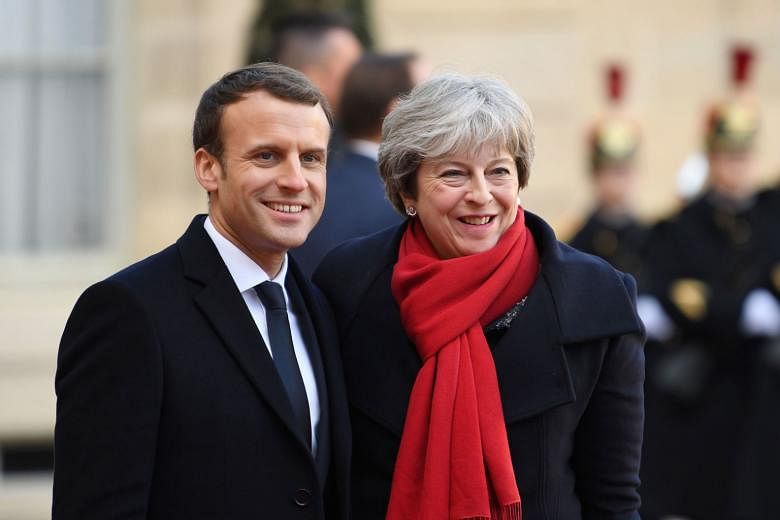LONDON - French President Emmanuel Macron is undertaking an unusual trip on Tuesday (Jan 16): he is visiting one of the immigration camps in Calais, France's northern city port, facing the channel with the British Isles.
The main purpose of this visit is to highlight the plight of migrants from the Third World as a thorn in Franco-British bilateral relations; Mr Macron is scheduled to meet British Prime Minister Theresa May for a summit between the two countries later this week.
But it also serves as a tacit admission that immigration, a topic President Macron largely downplayed during his electoral campaign last year, is rapidly becoming one of his most urgent domestic priorities.
Last May, Mr Macron won plaudits from Europe's leaders and adoring coverage from the continent's mainstream media for being the only leading candidate in his country's presidential election who refused to talk about tightening border controls. Unlike Ms Marine Le Pen, the leader of France's far-right National Front who based her entire campaign on racist slogans, Mr Macron emphasised France's "dignity" and its honourable tradition of providing a place of refuge for millions.
His ability to prevail and win votes without making any concessions to nationalists remains one of his most admired political achievements. Unfortunately, the French president cannot keep up the strategy.
In 2017, a record 100,000 applied for asylum in France, a jump of almost a fifth in the number of such applications.
Contrary to claims from pro-immigrant activists and non-governmental organisations, most of the additional asylum-seekers landing in France are not fleeing wars; instead, they come from places like Albania, a poor southern European state which seeks to join the European Union, or Haiti, a French-speaking Caribbean nation where, again, poverty rather than political violence is the problem. Riled by such statistics, President Macron now claims that, although France will continue to uphold its "moral and political duty" to admit those fleeing persecution, it "cannot welcome everybody".
Still, the measures which the French government is adopting remain controversial. An order signed last month by Mr Gerard Collomb, the French Interior Minister, instructing local authorities to collect information on the nationality of people sleeping in homeless shelters and authorising officers of the Office of Immigration and Integration to enter such shelters in order to identify undocumented migrants, has landed before the Council of State, France's highest legal authority, which is being asked to pronounce its constitutionality.
And an even trickier passage is expected to be given to Mr Collomb's new immigration and asylum Bill which will be unveiled in the next few weeks. This will allow French police to arrest undocumented migrants, slash by half the current 30-day period during which people can appeal against a rejection of their asylum applications and increase from 45 to 90 days the period during which illegal immigrants can be detained before their expulsion from France.
President Macron enjoys a crushing parliamentary majority and is still popular with the public. Furthermore, his move on immigration has put France's opposition in a dilemma: Mr Laurent Wauquiez, the newly-elected leader of the mainstream right Republicans, has hitherto kept his silence, largely because his own constituents actually support the government's initiative. So, the adoption of the new law is not in doubt.
Nevertheless, President Macron's own La République en Marche party, which was only cobbled together last year and includes people with little parliamentary experience and every political stripe, is confused by this sudden change in government strategy, with some MPs deeply uneasy about the proposed immigration restrictions.
By visiting a refugee camp in Calais composed of people seeking to use France as merely a transit point to Britain, Mr Macron is hoping to widen the debate about immigration beyond his domestic politics.
The French have long complained that Britain remains too much of a tempting target to migrants by failing to introduce identity cards, and is not doing enough to shoulder Europe's migration burdens; when they meet later this week, the French leader wants to ask Mrs May to accept more people from immigration centres in France as well as offer more cash towards their upkeep in France.
Since Britain needs France's support in its current separation negotiations with the European Union, Mrs May is ready to offer more cash, but she is loath to accept any more migrants. Besides, British diplomats claim that even if all the 1,000-odd migrants still stranded in Calais are admitted by Britain, this won't even begin to tackle France's immigration problem which can only be handled inside France.
Mr Macron won't be the first leader to discover that lofty aspirations during electoral campaigns seldom survive first contact with reality.


